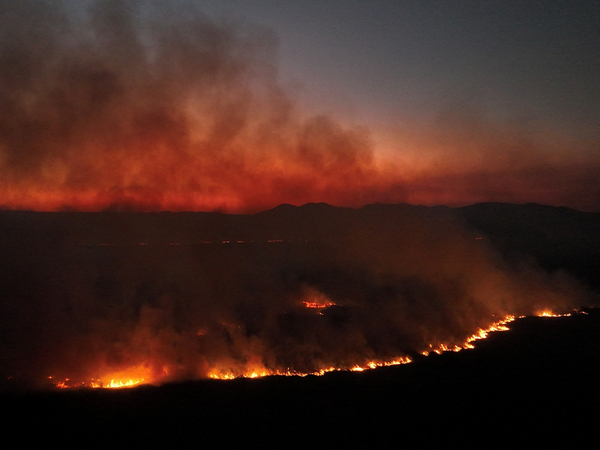
Brasilia: Brazil's Pantanal, renowned as the largest tropical wetland on the planet, is currently engulfed in an unprecedented wave of fires, setting grim new records for June, CNN reported.
Aerial images of this vast expanse reveal billowing smoke and the stark, vivid hues of flames, while closer inspection of the charred aftermath exposes a haunting scene.
The National Institute of Space Research (INPE) of Brazil has documented a staggering 733 fires within the Pantanal biome thus far in June alone. This figure surpasses the previous record set in 2005, which stood at 435 fires for the entire month of June.
The state of Mato Grosso do Sul, encompassing 60 per cent of the Pantanal, faces an alarming "danger" advisory due to an impending heatwave, predicted to push temperatures 5oC above average over the next three to five days, as warned by Brazil's National Meteorological Institute (INMET), as reported by CNN.
The World Wildlife Foundation (WWF) Brazil has issued a dire forecast, cautioning that 2024 could potentially become the worst year on record for the Pantanal. The dry season has only just begun, yet the number of fires recorded this year has surged by an astonishing 898 per cent compared to the same period in 2023, based on data from INPE.
Cynthia Santos, a conservation analyst for WWF Brazil, emphasized the urgent need for action, stating, "It is necessary to act quickly reinforcing [fire] brigades and counting with the support of the local communities to avoid a catastrophe."
The Pantanal's ecological balance hinges on what scientists term the "flood pulse." During the wet season from November to March, vast stretches of this plain are submerged, only to recede during the dry months from April to September. This cyclical inundation transforms the Pantanal into a unique biome where extensive areas alternately transition between terrestrial and aquatic habitats.
Wetlands like the Pantanal are crucial carbon sinks, adept at absorbing and sequestering carbon dioxide from the atmosphere. Encompassing approximately 2,00,000 square kilometers, the Pantanal constitutes about 3 per cent of the world's wetlands and plays a pivotal role in the global carbon cycle.
The devastation wrought by these fires releases substantial quantities of greenhouse gases back into the atmosphere, exacerbating the greenhouse effect and global warming, according to CNN.
According to the World Wide Fund for Nature (WWF), the Pantanal boasts an unparalleled concentration of biodiversity in South America, surpassing even its more renowned neighbour, the Amazon. Andre Luiz Siqueira, CEO of ECOA, an environmental NGO based in Mato Grosso do Sul, underscored its significance, remarking, "The Pantanal is very important for the planet, it has unique wild areas that are fundamental to life on Earth."
This vast wetland serves as a sanctuary for numerous endangered and distinctive species, including jaguars, capybaras, black caimans, giant otters, and hyacinth macaws. Moreover, it serves as a crucial stopover for approximately 180 species of migratory birds.
The Pantanal currently faces what experts describe as a "hydrological crisis," exacerbated by an intense drought that commenced in 2023 and has been compounded by the ongoing El Nino phenomenon, as highlighted by ECOA.
While sporadic wildfires are a natural occurrence in the Pantanal, some plant species in the region have developed adaptations to withstand fire, such as thick bark or seeds encased in hard shells.
In 2020, wildfires devastated unique habitats and disrupted the livelihoods of the Pantanal's diverse indigenous communities, underscoring the profound impact of these infernos on both the environment and human societies, CNN reported.